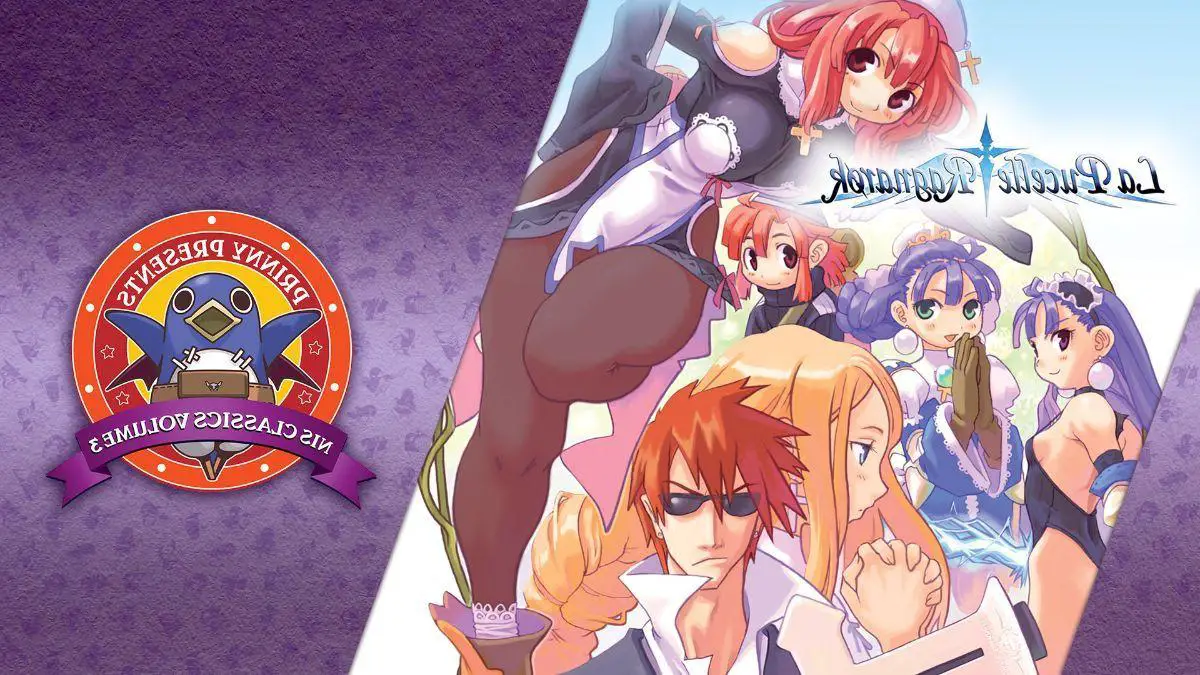La Pucelle: Ragnarok is a beautifully looking strategical role-playing game, or SRPG, that focuses heavily on tactical combat and character development. While SRPGs in general favour engaging gameplay over writing, La Pucelle actually manages to find a good balance between these two. Originally released on the PS2 as La Pucelle: Tactics in 2002 in Japan and 2004 in North America respectively, the game was then ported in 2009 to the PSP as La Pucelle: Ragnarok before finally hitting the PC in 2022, not without the addition of more Quality of Life improvements.
Insert nostalgia
I haven’t actually played the original PS2 game, but this remaster still emanates this sweet reminiscing scent of happy weekends, filled with hours of playing a good video game. The distinctive 16Bit look and the mellow color palette instantly create some happy mind place. The main plot quickly picks up this feeling but, over time, surprises with a couple of dark and heavy plot twists. At first, the background story comes across as your typical run-of-the-mill JRPG scenario.
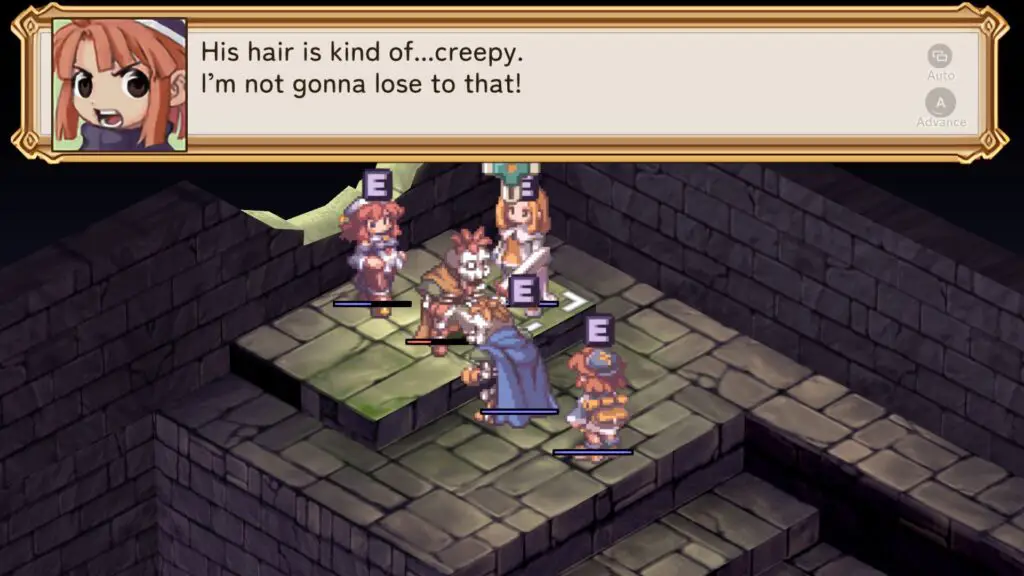
A Dark Prince will rise to unleash literal hell onto the world. To conquer this, a maiden of light, sent by the Goddess Poitreene, steps in to prevent a calamity from happening. Now, this doesn’t sound very innovative but the storyline is only the stage, set for a cast of multifaceted characters to play on. The main protagonists’ Prier and Culotte, a duo of orphan siblings between the ages of 16 and 12, didn’t take long before they made me smile and chuckle. In fact, I was surprised by how good the narrative became fleshed out over the course of 12 chapters.
While the siblings do of course act childish, they do it in just the right way. They fail, learn, and rarely repeat the same mistakes. Their unusual professions as demon hunters for a small church put them in situations that become increasingly dark and mature throughout the game. As part of the group La Pucelle, it is their job to investigate crimes of otherworldly nature that will lead to a conflict with a rival church. Prier is a hot-head and clearly needs a longer fuse, but she also puts actions to her words and has the heart at the right place. It’s hard not to like Prier, as every quirk makes her journey to become the new maiden of light even more interesting.
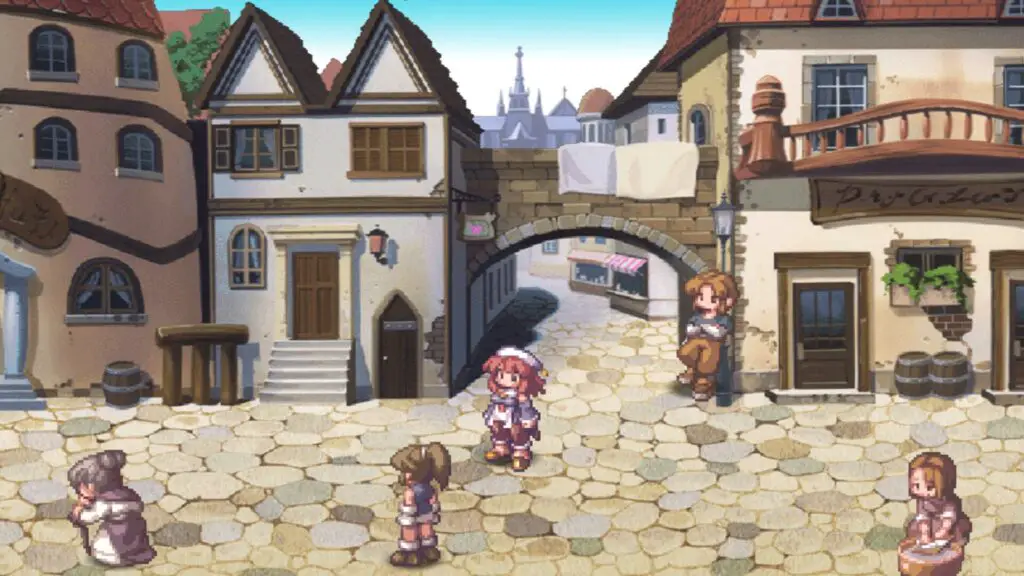
The same goes for her younger brother Culotte, who at times acts very precocious just to be reminded moments later that he is still a boy. The rest of the cast is equally well-written and I’m glad there is a nice balance between flat jokes and deep narrative. If you are a fan of the Disgaea-Series you most likely know that La Pucelle is the predecessor to Disgaea: Hour of Darkness and as such, both games have much in common. The writing however feels more mature and ultimately more important than it was in Disgaea. The meat of this game is still the tactical combat and the multitude of different ways to create over-the-top powerful characters.
Hit where it hurts
La Pucelle: Ragnarok offers tactical combat that instantly feels familiar to Disgaea-Fans. If you’re entirely new to the series or genre at all, I’d highly recommend taking the tutorials to heart as the difficulty ramps up pretty quickly, although not as much as the overall complexity. The basics are simple: Characters spend points to move around on battle maps of differing sizes. When an enemy can be reached via normal or special attack, it’s often helpful to assemble your party first, as many of them can join the fight, even if they are only bystanders.
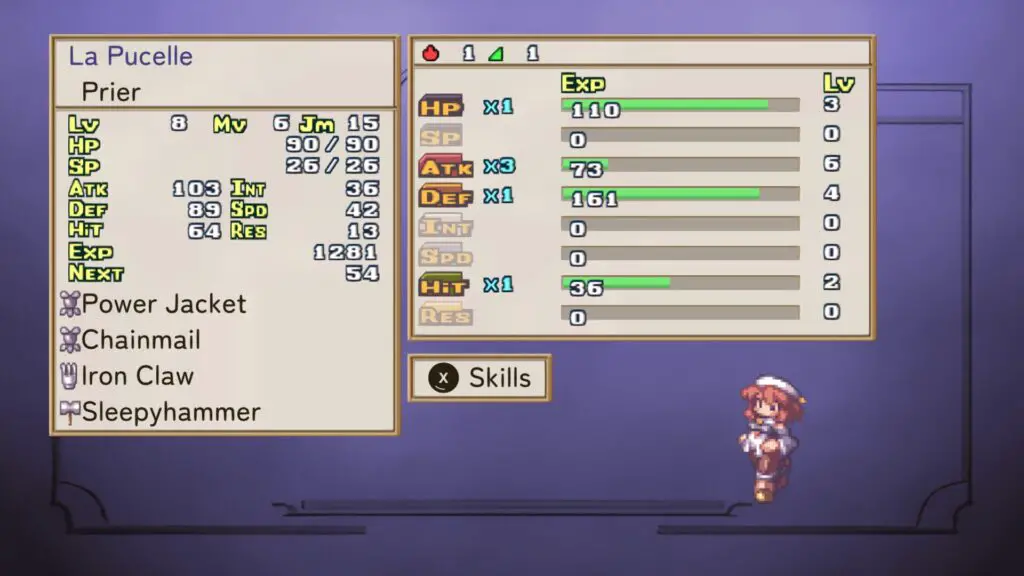
This also means that you should keep an eye out for your positioning since attacks from the side and behind do more damage. Also, higher ground leads to increased pain on the receiving end so make sure to use the terrain to full advantage. La Pucelle offers a very unique technique called Purification. This allows the party to recruit monsters on the field, even many bosses. This comes at a price though as using the Purification action eats your turn and convincing an opponent to join sometimes takes multiple rounds. If you are successful though, you instantly get the chance to call your new monster to work.
Your new companions level in the same way as the regular characters do but with less potential to become unbeatable killing machines. They often work as great cannon fodder or must be equipped and sent away into Dark World. Doing so grants new items and even allows combining multiple items into one, strengths and weaknesses included. Purification is also necessary for another system that becomes extremely important in later, more difficult stages of the game.
Every map holds a couple of dark portals. These would spawn monsters if you weren’t able to close them beforehand. Closing them means using Purification which does a certain amount of damage to the portal you were aiming at. Once destroyed, the responsible character is granted a Re-Action, meaning they do get another turn. Strategically speaking, this is so powerful that you might end up beating every enemy in the first round. That is, if you were smart enough to make use of the second reason why there are dark portals.
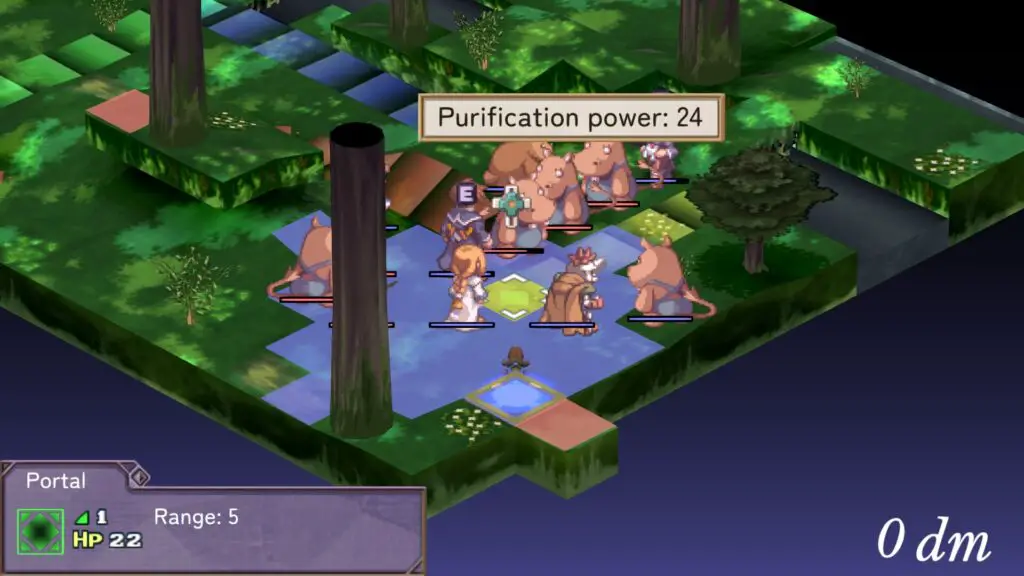
Many of them release a stream of energy that can be channeled into new directions and even combined into new colors with very different effects. If you manage to turn the stream into a full circle consisting of 15 tiles, a special ability or “miracle” is triggered. These do either damage or heal your allies, depending on the stream color. Miracles seem like a must-master technique to not only progress further into the game but as a form of speeding off leveling.
Like Disgaea, La Pucelle: Ragnarok is a game that tends to become grindy. Whoever takes part in a fight receives experience points, but this does not only include character levels but also stat values. The system to increase the stat points, abilities, and spells of every character might be the single best and worst thing at the same time, as it offers a vast amount of freedom for player specialization, which could ultimately lead to useless characters if you were not fully aware of what you were doing. Or supposed to be doing.
Character abilities aren’t only tied to character levels but also to status points. To create the character of your dreams, it is possible to equip everyone with different equipment. These not only offer flat stat-increasements but also stat value multipliers, so if you want to play a mage, you’ll equip the character in question with many staffs that increase intelligence. That makes sense, right? However, even the equipment can be leveled which leads to a whole new discussion about min-maxing and which item to focus on which character.
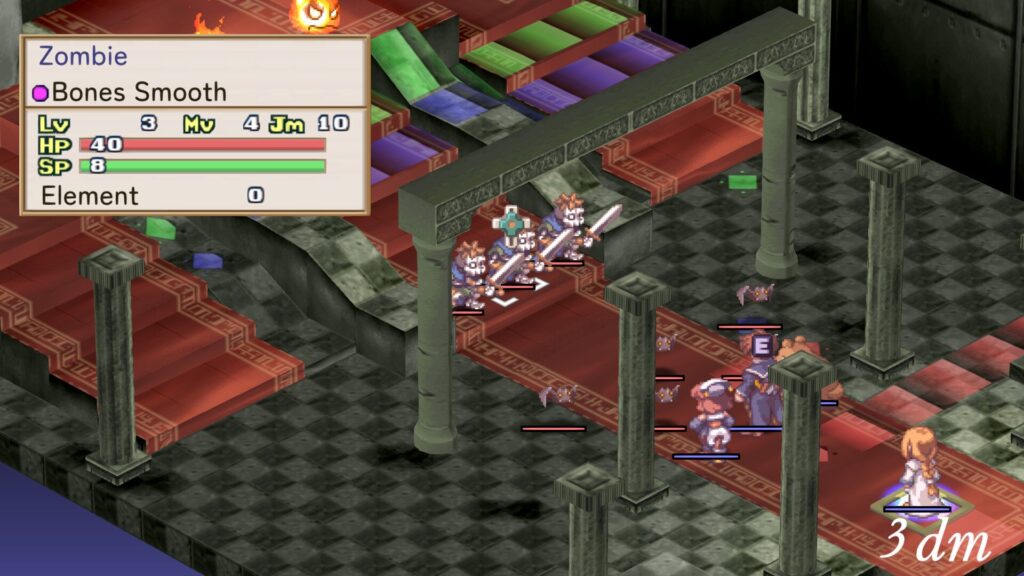
I still think that, as tedious as this may sound, it is still a very strong aspect of La Pucelle: Ragnarok and a big part of where the fun comes from. Create a party of inhumanly strong characters and form them to your own liking. As is the case with Disgaea, La Pucelle can become borderline easy if you simply invested enough time to power-level your party. Speaking of easy: the enemy AI is, quoting a mildly famous Youtube creator of lengthy videos, “far more A than I” as it often can be tricked into questionable decisions.
Enemies tend to focus on your weakest party member, be it a normal character or a monster. This can be used to divert enemy forces to the sides of the screen or open them up for pincer attacks. The difficulty of different maps often comes from being outnumbered or drawn out battles if you were unlucky with portal placements and enemy reinforcements.
Quality of life and sound
This version of La Pucelle: Ragnarok comes with some neat additions and improvements. Some graphics got an HD-lifting. This makes them feel a bit blurry on very high resolutions, but I think the backgrounds look amazing. Also, playing on Steam Deck is a real treat, which comes to no surprise as the game already felt great on the PSP. Battle and animation speed can be easily increased and I feel like this was extremely helpful for me when a battle became drawn out and I didn’t have the time or stamina to fight for one hour straight.
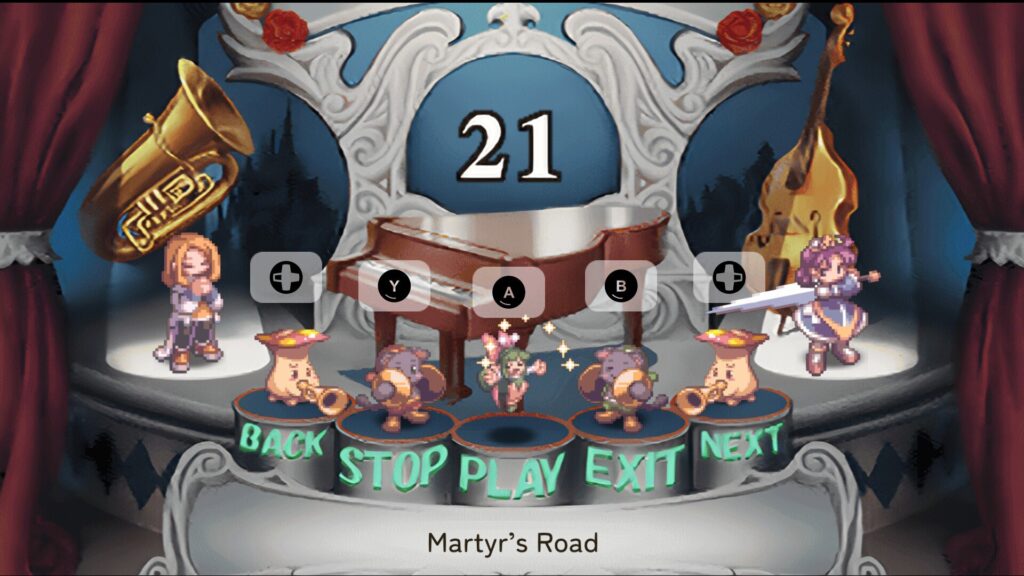
This version of the game is also uncensored. If you were playing La Pucelle in 2004, chances are you played the US version which didn’t have any religious icons and other minor or more delicate changes. What hasn’t changed is the amazing soundtrack. It offers a wide selection of either calm and soothing tracks next to your typical S(J)RPG-battletune. I can only imagine your memories and thoughts if you were lucky enough to play this game on PS2 or PSP, hearing these songs again after so many years. The best thing is that you can listen to every song when you’re visiting the big city shop. Enjoy!
What might be less enjoyable are some of the voiceovers that were used in the game. While they do make many conversations a bit more colorful and the voices do sound fine for the most part, their connotations tend to feel all over the place like the character isn’t really part of the current situation. You could argue that adding voices wasn’t entirely necessary, however, Prier’s swearing is just too entertaining to be left out.
Conclusion
Recommending La Pucelle: Ragnarok feels pretty easy. If you are a longtime Disgaea fan who hasn’t played this game yet, I highly recommend getting this upgraded and updated version of what is seen as predecessor to the franchise that made NiS a tactical roleplaying authority. Experiencing firsthand where many of Disgaea’s skills and techniques originate from is as fun as playing the game itself.
Newcomers or players who rarely touch SRPGs should be warned and advised that this game can be pretty tough, overwhelming and complicated. It feels and plays like a true “git gud” game that rewards clever tactics as much as stoic grinding. If you don’t understand the miracle system or can’t figure out how to level up your characters in a useful way, I highly recommend looking up an online guide.
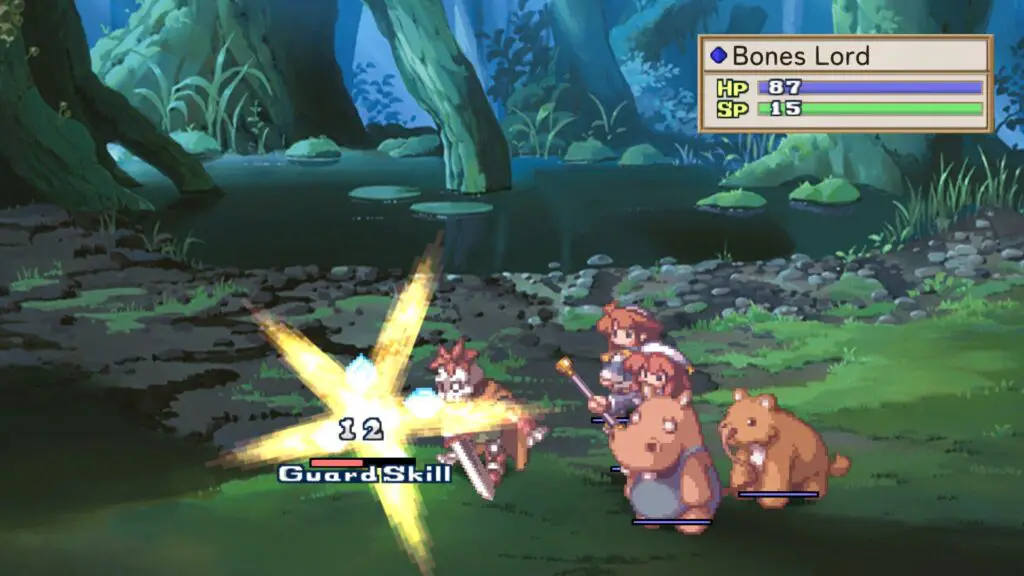
However, once you got a grasp of all the interwoven stats, techniques, and systems, La Pucelle really starts to shine. Creating your party with the help of some monster companions is exceptionally fun and completing missions often rewards the player not only with gold and items but also interesting bits of story and banter. The plot is an interesting tale of inner and outer demons, seen through the eyes of very relatable characters and is way more elaborate than your typical SRPG could ever hope for.
La Pucelle: Ragnarok is a game that takes you back to these great afternoons spent in front of the TV, having fun for hours on end. It looks and feels like a real classic. And grind aside – in the end, nothing beats the sensation of having completely overpowered characters wreaking instant havoc to an army of demons without breaking a sweat.
Disclaimer: The key for La Pucelle: Ragnarok was generously provided by NiS America.

